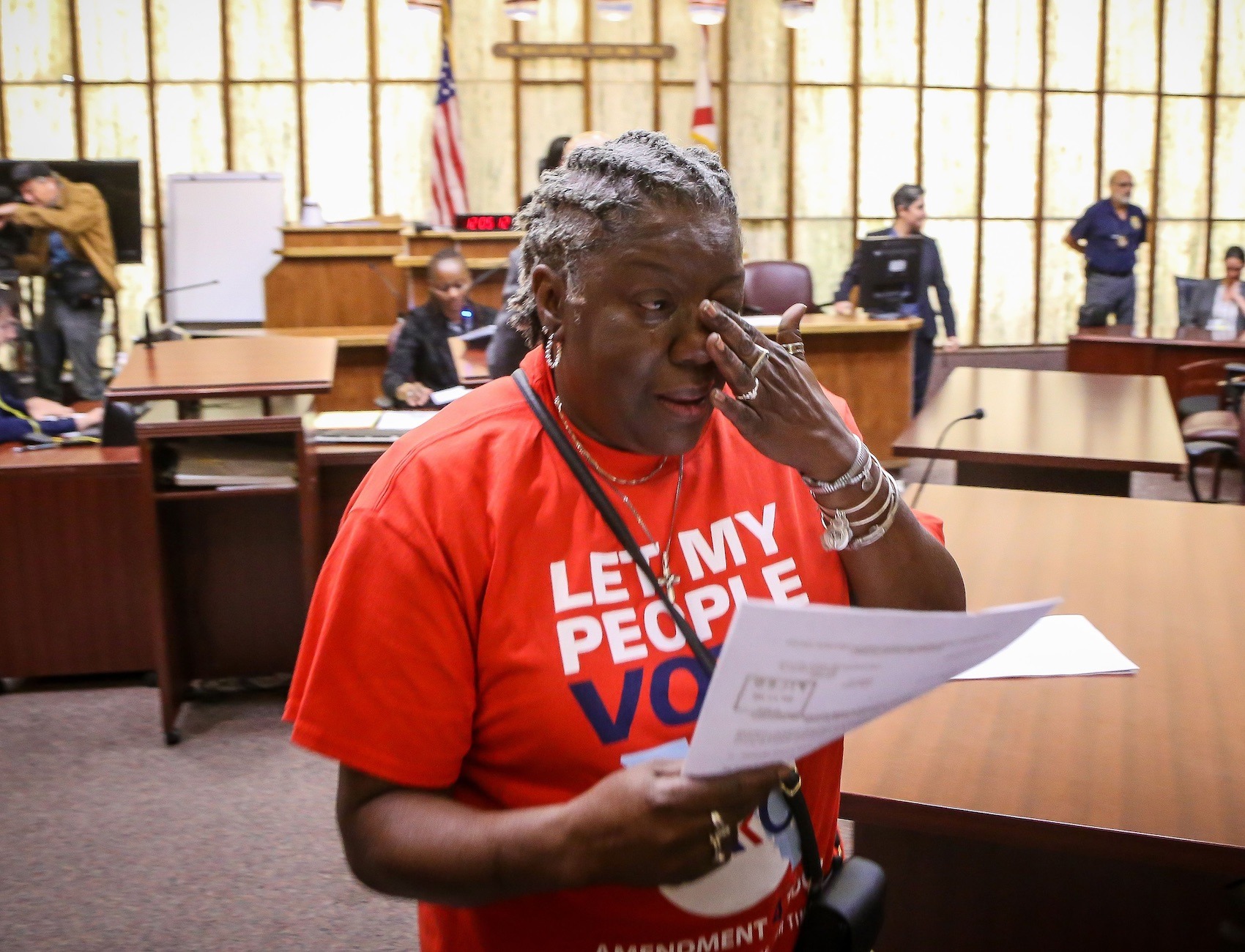Florida Can’t Bar People From Voting Because of Inability to Pay, Appeals Court Says
The court found that a law that critics described as a poll tax violates the Constitution.

Florida cannot bar people with felony convictions from voting if they can’t pay court-issued fines and fees, a federal appeals court ruled on Wednesday.
A panel of judges with the Eleventh Circuit Court of Appeals upheld a lower court’s injunction, finding that the 17 named plaintiffs cannot be barred from voting because of their inability to pay their court-issued fines and fees. The court found that such a requirement violates the Equal Protection Clause of the 14th Amendment.
“Because the legal financial obligation requirement punishes those who cannot pay more harshly than those who can—and does so by continuing to deny them access to the ballot box—Supreme Court precedent leads us to apply heightened scrutiny,” the court wrote in its opinion.
In November 2018, nearly 65 percent of Florida voters approved Amendment 4, a constitutional amendment to restore voting rights to most Floridians with felony convictions who have completed their sentence. Previously, Florida had been one of just four states that permanently disenfranchised everyone with a felony conviction for life.
After its passage, the definition of when an individual has completed all terms of their sentence became fiercely debated.
Just a few months later, the GOP-controlled legislature passed and Governor Ron DeSantis signed into law Senate Bill 7066, legislation requiring the payment of court-issued fines and fees before people could have their voting rights restored. The bill allowed courts to convert fines and fees into community service hours, and some state attorneys considered making efforts to waive fines and fees en masse, but the process proved complicated and difficult, given the decentralized way that financial obligations are tracked in Florida.
The new law left many potential voters confused as to whether they owed fines and fees, unsure how to determine what they owed, and concerned that they might be committing another felony by registering to vote.
Wednesday’s opinion comes one day after Florida’s voter registration deadline for the state’s March 17 primary. Those who have not yet registered because they thought they were ineligible will not be permitted to participate in the upcoming primary.
Although the opinion only directly applies to the 17 named plaintiffs, both the parties and the court used broader language, understanding that it could soon mean that anyone with a felony conviction who owes fines and fees and is unable to pay them will be permitted to vote anyway. The court left it to the state to find a “reasonable,” “good faith” way to define the term “genuine inability to pay.”
Research has shown that the vast majority of court-issued fines and fees go unpaid. University of Florida Professor Daniel Smith, an expert called by plaintiffs in the federal court lawsuit, compiled data from a majority of Florida counties and wrote in an August 2019 report that over 80 percent of people with felony convictions who had completed their terms of incarceration, parole, and probation had outstanding financial obligations. Over 37 percent of those people owed at least $1,000.
Voting advocates called the Florida law a poll tax—invoking the strategy used to keep African Americans from voting in the Jim Crow South—and immediately filed multiple lawsuits. Wednesday’s ruling is in response to one of those lawsuits, filed by 17 people with felony convictions who say they have various financial hardships and cannot afford to pay off their fines and fees. In its opinion, the court explained that the right to vote under Amendment 4 cannot be tied to ability to pay.
“These plaintiffs are punished more harshly than those who committed precisely the same crime—by having their right to vote taken from them likely for their entire lives,” the opinion said. “And this punishment is linked not to their culpability, but rather to the exogenous fact of their wealth.”
Julie Ebenstein, senior staff attorney with the ACLU’s Voting Rights Project who argued the case before the Eleventh Circuit, praised the ruling.
“The court unanimously ruled that a person’s right to vote cannot be contingent upon their ability to pay,” she said in a statement. “This law is a modern-day poll tax. This ruling recognizes the gravity of elected officials trying to circumvent Amendment 4 to create roadblocks to voting based on wealth.”
Helen Aguirre Ferré, DeSantis’ communications director, said on Twitter that the state plans to ask the Eleventh Circuit to reconsider the case en banc. The state could also appeal that ruling to the U.S. Supreme Court. As a result, it remains to be seen what effect the ruling will have on the 2020 election.
